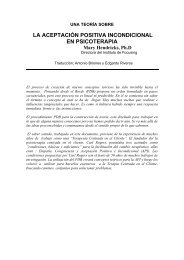8 Focusing en de experiëntiële aspecten van psychotherapie
8 Focusing en de experiëntiële aspecten van psychotherapie
8 Focusing en de experiëntiële aspecten van psychotherapie
Create successful ePaper yourself
Turn your PDF publications into a flip-book with our unique Google optimized e-Paper software.
Literatuur<br />
Sartre, J-P. (1996). Exist<strong>en</strong>tialism. In L. Cahoone (Red.), From mo<strong>de</strong>rnism to postmo<strong>de</strong>rnism: An anthol-<br />
ogy (pp. 169-174). Cambridge, MA: Blackwells Publishers Ltd.<br />
Sartre, J-P. (2003). Het zijn <strong>en</strong> het niet. Rotterdam: Lemniscaat.<br />
Satir, V. (1972). Peoplemaking. Palo Alto: Sci<strong>en</strong>ce and Behavior Books.<br />
Schaefer, C.E., & Carey, L.J. (Red.). (1994). Family play therapy. Northvale, NJ: Jason Aronson.<br />
Schaefer, E.S. (1965). Configurational analysis of childr<strong>en</strong>’s reports of par<strong>en</strong>t behavior. Journal of Consulting<br />
Psychology, 29, 552-557.<br />
Schaeffer, H.J. (1984). The child’s <strong>en</strong>try into a social world. London: Aca<strong>de</strong>mic Press.<br />
Scharwächter, P. (2001). De integratie <strong>van</strong> focusing-georiënteer<strong>de</strong> <strong>psychotherapie</strong> in het driefasemo<strong>de</strong>l<br />
voor <strong>de</strong> behan<strong>de</strong>ling <strong>van</strong> <strong>de</strong> posttraumatische stress-stoornis. Tijdschrift Cliëntgerichte Psychotherapie,<br />
39, 115-135.<br />
Schlippe, A.V., & Schweitzer, J. (2003). Lehrbuch <strong>de</strong>r systemisch<strong>en</strong> Therapie und Beratung (9th ed.). Götting<strong>en</strong>:<br />
Vand<strong>en</strong>hoeck + Ruprecht.<br />
Schmid, P.F. (1992). ‘Die Traumkunst träumt, und alle Zeich<strong>en</strong> trüg<strong>en</strong>…’. Der traum als Encounter und<br />
Kunstwerk. In P. Fr<strong>en</strong>zel, P.F. Schmid, & M. Winkler (Red.), Handbuch <strong>de</strong>r personz<strong>en</strong>triert<strong>en</strong> Psychotherapie<br />
(pp.391-409). Köln: Edition Humanistische Psychologie.<br />
Schmid, P.F. (1994). Person<strong>en</strong>z<strong>en</strong>trierte Grupp<strong>en</strong><strong>psychotherapie</strong> - Ein Handbuch. I. Solidarität und Autonomie.<br />
Koln: Edition Humanistische Psychologie.<br />
Schmid, P.F. (1996). Person<strong>en</strong>z<strong>en</strong>trierte Grupp<strong>en</strong><strong>psychotherapie</strong> in <strong>de</strong>r Praxis - Ein Handbuch. II. Die Kunst<br />
<strong>de</strong>r Begegnung. Pa<strong>de</strong>rborn: Junfermann Verlag.<br />
Schmid, P.F. (1998). On becoming a person-c<strong>en</strong>tred approach: A person-c<strong>en</strong>tred un<strong>de</strong>rstanding of the<br />
person. In B. Thorne & E. Lambers (Red.), Person-c<strong>en</strong>tred therapy. A European perspective (pp. 38-52).<br />
London: Sage.<br />
Schmid, P.F. (2001a). Auth<strong>en</strong>ticity: The person as his or her own author. Dialogical and ethical perspectives<br />
on therapy as an <strong>en</strong>counter relationship. And beyond. In G. Wyatt (Red.), Rogers’ therapeutic<br />
conditions: Evolution, theory and practice. Vol. 1. Congru<strong>en</strong>ce (pp. 223-228). Ross-on-Wye, UK: PCCS<br />
Books.<br />
Schmid, P.F (2001b). Acknowledgem<strong>en</strong>t: The art of responding. Dialogical and ethical perspectives on<br />
the chall<strong>en</strong>ge of unconditional relationships in therapy and beyond. In J. D. Bozarth & P. Wilkins<br />
(Red.), Rogers’ therapeutic conditions: Evolution, theory and practice. Vol 3. Unconditional positive<br />
regard (pp. 49-64). Ross-on-Wye, UK: PCCS Books.<br />
Schmid, P.F. (2001c). Compreh<strong>en</strong>sion: The art of not knowing. Dialogical and ethical perspectives on<br />
empathy as dialogue in personal and person-c<strong>en</strong>tred relationships. In S. Haugh & T. Merry (Red.),<br />
Rogers’ therapeutic conditions: Evolution, theory and practice. Vol. 2. Empathy (pp. 53-71). Ross-on-<br />
Wye, UK: PCCS Books.<br />
Schmid, P.F. (2001d). Perzonz<strong>en</strong>trierte Grupp<strong>en</strong><strong>psychotherapie</strong>. In P. Fr<strong>en</strong>zel, W.W. Keil, P.F. Schmid, & H.<br />
Stölz (Red.) Kli<strong>en</strong>t<strong>en</strong>-/Perzonz<strong>en</strong>trierte Psychotherapie. Kontexte, Konzepte, Konkretisierung<strong>en</strong> (pp.<br />
294-322). Wi<strong>en</strong>: Facultas.<br />
Schmid, P.F. (2002). Pres<strong>en</strong>ce: Im-media-te co-experi<strong>en</strong>cing and co-responding. Ph<strong>en</strong>om<strong>en</strong>ological, dialogical<br />
and ethical perspectives on contact and perception in person-c<strong>en</strong>tred therapy and beyond.<br />
In G. Wyatt & P. San<strong>de</strong>rs (Red.), Rogers’ therapeutic conditions: Evolution, theory and practice. Vol. 4.<br />
Contact and perception (pp. 182-203). Ross-on-Wye, UK: PCCS Books.<br />
Schmid, P.F. (2004) Back to the cli<strong>en</strong>t: a ph<strong>en</strong>om<strong>en</strong>ological approach to the process of un<strong>de</strong>rstanding<br />
and diagnosis. Person-C<strong>en</strong>tered & Experi<strong>en</strong>tial Psychotherapies 3, 36-51.<br />
629










